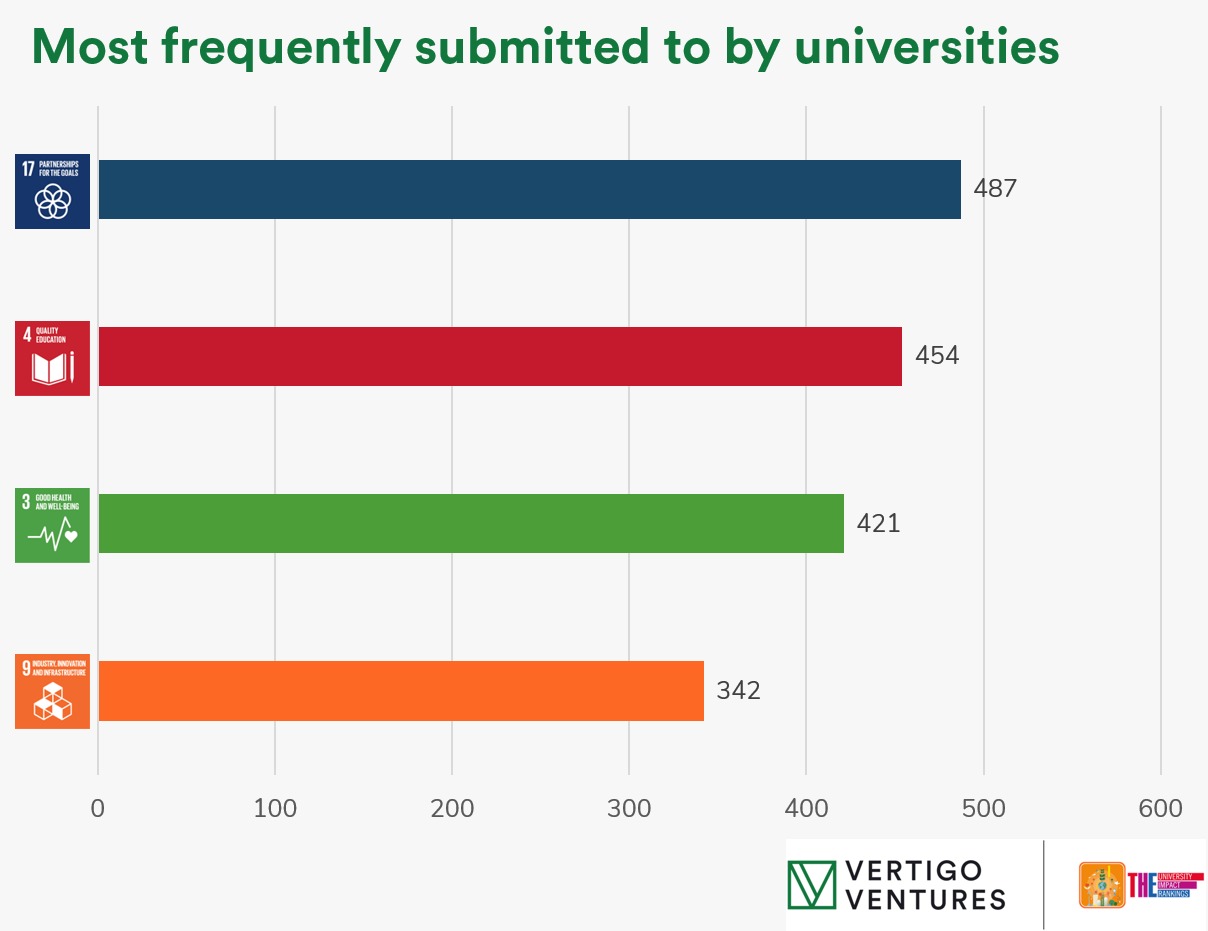The Times Higher Education (THE) University Impact Rankings have been released. But what are they, and what do they have to say about global higher education?
The impact of the Impact Rankings
The THE University Impact Rankings measure the success of higher education institutions globally in delivering against the United Nation’s Sustainable Development Goals (SDGs). More than 560 universities from 80 countries across six continents have taken part.
At Vertigo Ventures, we’ve been working closely with the THE to steer the direction of this research – in line with our mission to help leading research organisations identify, capture, and report on the impact of their work and drive global recognition of how higher education impacts society on a global level. In this blog, we’re going to take a look at the methodology and the metrics underpinning these rankings and why the rankings matter, especially for institutions not usually recognised in HE league tables.
Methodology and metrics
The UN SDGs have been in force since January 2016. Each one is designed to address a different global challenge – ranging from poverty and inequality to peace and climate change.
The rankings required universities to submit data on the impact they’ve had on up to 11 of the 17 SDGs. Each institution has latitude to pick which goals they report on, enabling them to highlight their achievements in the areas most relevant to them and their surrounding communities.
Only one goal was compulsory: SDG 17, Partnerships for the Goals – a goal centred around collaboration. This is because collaboration is something that’s both vital for institutional success, and for impacting on the remaining SDGs. The rankings provide an excellent opportunity for higher education organisations to demonstrate exactly how they’re contributing to each goal. We hope they inspire more institutions to get involved.
The ten optional SDGs that universities can report on are:
- SDG#3: Good Health and Well-Being
- SDG#4: Quality Education
- SDG#5: Gender Equality
- SDG#8: Decent Work and Economic Growth
- SDG#9: Industry, Innovation and Infrastructure
- SDG#10: Reduced Inequalities
- SDG#11: Sustainable Cities and Communities
- SDG#12: Responsible Consumption and Production
- SDG#13: Climate Action
- SDG#16: Peace, Justice and Strong Institutions
The THE University Impact Rankings are designed to be as inclusive as possible: they’re open to all universities and institutions which offer undergraduate programmes. They include an overall ranking of universities based on data for SDG17 plus the best three SDGs per university and highlight the top performing universities for each SDG through an individual ranking.
Sourced from university submissions and existing Elsevier datasets, each goal is weighted equally, given its own metrics, and designed to filter out any biases related to wealth.
You can find out more about the methodology and metrics via our webinar.
Vertigo Ventures clients in the development rankings
At Vertigo Ventures, we’re experts in international impact – and we’re delighted to see that all of our clients have performed very well:
- Kings College London ranked 5th overall
- The University of Wollongong came in 12th
- The University of Sydney came in 23rd
A further nine institutions that we work with have been listed in the top 150 overall, and when it comes to individual SDG rankings, another five achieved excellent results:
- The University of Worcester ranked 16th in SDG#17 Partnerships for the Goals
- The University of Sydney ranked 4th in SDG#3 Good Health and Well-Being, 7th in SDG#8 Decent Work and Economic Growth and 13th in SDG#5 Gender Equality
- Hong Kong Baptist University ranked 15th in SDG#13 Climate Action and 16th in SDG#8 Decent Work and Economic Growth
- The Australian Catholic University ranked 25th in SDG#3 Good Health & Well-Being
Congratulations to all!
Why the THE University Impact Rankings matter
Levelling the institutional playing field
These rankings were designed to make it easy for all universities to participate – regardless of their resources, their endowments, and their sizes. The aim is to create a level playing field to enable institutions to show the impact of their work.
This has led to excellent showings from universities that wouldn’t necessarily chart in traditional ranking league tables, and wider participation from institutions of all sizes the world over. This is particularly important, because universities from the developing countries often find themselves excluded from league tables due to publication thresholds and other disqualifying criteria – even if these universities have a positive social impact. Their participation demonstrates how universities from developing nations can deliver against SDGs, do outstanding work and create a positive impact on their local and regional communities.
These rankings are focussed on understanding how the higher education sector is making a positive contribution to society and the environment. They’re about supporting behaviour change among universities worldwide and identifying whether research policy is making a difference. This will allow institutions with highly specific remits to appear in the rankings and hopefully attract more students and more funding as a result.
Funding and impact
In 2019, every higher education institution should be acutely aware of its impact on society. In fact, it’s becoming increasingly intertwined with their financial futures. Since the last round of funding for example, weighting of impact has increased from 20% to 25% in the REF, meaning that measuring impact and demonstrating the difference universities are making (for example progress towards the SDGs) will only get more important. This is a worldwide trend and something universities need to take very seriously – especially now, with the advent of the THE University Impact Rankings, it’s being officially measured.
Need help demonstrating the impact of your institution’s work, or preparing for a national research assessment exercise? Talk to our team of impact specialists today.
